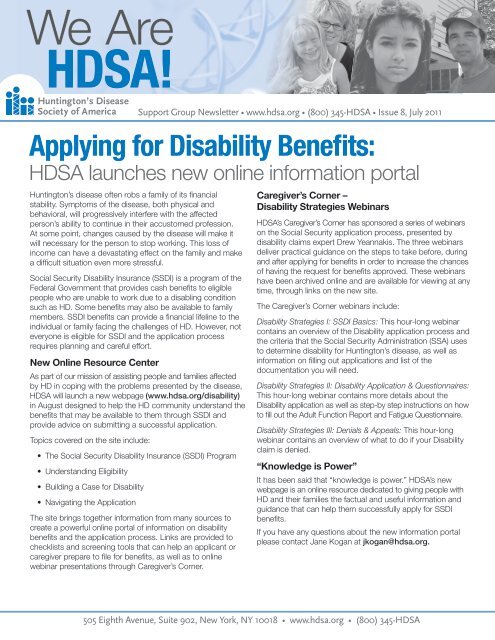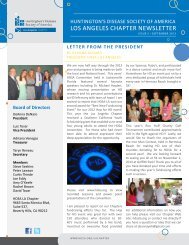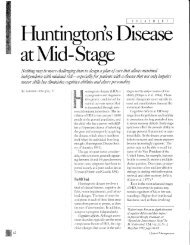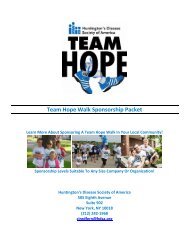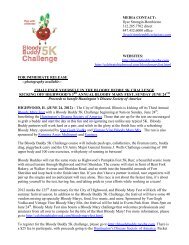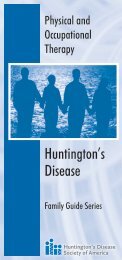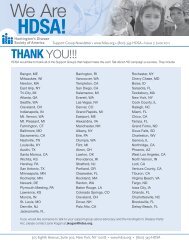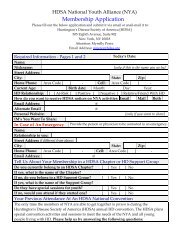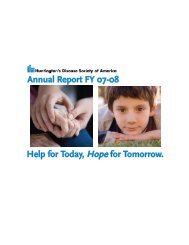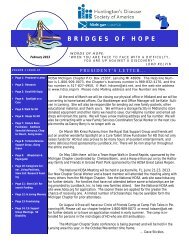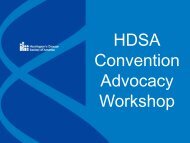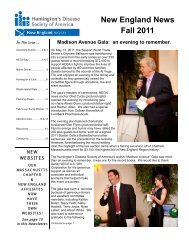Applying for Disability Benefits, by Jane Kogan, We Are HDSA, July ...
Applying for Disability Benefits, by Jane Kogan, We Are HDSA, July ...
Applying for Disability Benefits, by Jane Kogan, We Are HDSA, July ...
Create successful ePaper yourself
Turn your PDF publications into a flip-book with our unique Google optimized e-Paper software.
<strong>We</strong> <strong>Are</strong><br />
<strong>HDSA</strong>!<br />
Support Group Newsletter • www.hdsa.org • (800) 345-<strong>HDSA</strong> • Issue 8, <strong>July</strong> 2011<br />
<strong>Applying</strong> <strong>for</strong> <strong>Disability</strong> <strong>Benefits</strong>:<br />
<strong>HDSA</strong> launches new online in<strong>for</strong>mation portal<br />
Huntington’s disease often robs a family of its financial<br />
stability. Symptoms of the disease, both physical and<br />
behavioral, will progressively interfere with the affected<br />
person’s ability to continue in their accustomed profession.<br />
At some point, changes caused <strong>by</strong> the disease will make it<br />
will necessary <strong>for</strong> the person to stop working. This loss of<br />
income can have a devastating effect on the family and make<br />
a difficult situation even more stressful.<br />
Social Security <strong>Disability</strong> Insurance (SSDI) is a program of the<br />
Federal Government that provides cash benefits to eligible<br />
people who are unable to work due to a disabling condition<br />
such as HD. Some benefits may also be available to family<br />
members. SSDI benefits can provide a financial lifeline to the<br />
individual or family facing the challenges of HD. However, not<br />
everyone is eligible <strong>for</strong> SSDI and the application process<br />
requires planning and careful ef<strong>for</strong>t.<br />
New Online Resource Center<br />
As part of our mission of assisting people and families affected<br />
<strong>by</strong> HD in coping with the problems presented <strong>by</strong> the disease,<br />
<strong>HDSA</strong> will launch a new webpage (www.hdsa.org/disability)<br />
in August designed to help the HD community understand the<br />
benefits that may be available to them through SSDI and<br />
provide advice on submitting a successful application.<br />
Topics covered on the site include:<br />
• The Social Security <strong>Disability</strong> Insurance (SSDI) Program<br />
• Understanding Eligibility<br />
• Building a Case <strong>for</strong> <strong>Disability</strong><br />
• Navigating the Application<br />
The site brings together in<strong>for</strong>mation from many sources to<br />
create a powerful online portal of in<strong>for</strong>mation on disability<br />
benefits and the application process. Links are provided to<br />
checklists and screening tools that can help an applicant or<br />
caregiver prepare to file <strong>for</strong> benefits, as well as to online<br />
webinar presentations through Caregiver’s Corner.<br />
Caregiver’s Corner –<br />
<strong>Disability</strong> Strategies <strong>We</strong>binars<br />
<strong>HDSA</strong>’s Caregiver’s Corner has sponsored a series of webinars<br />
on the Social Security application process, presented <strong>by</strong><br />
disability claims expert Drew Yeannakis. The three webinars<br />
deliver practical guidance on the steps to take be<strong>for</strong>e, during<br />
and after applying <strong>for</strong> benefits in order to increase the chances<br />
of having the request <strong>for</strong> benefits approved. These webinars<br />
have been archived online and are available <strong>for</strong> viewing at any<br />
time, through links on the new site.<br />
The Caregiver’s Corner webinars include:<br />
<strong>Disability</strong> Strategies I: SSDI Basics: This hour-long webinar<br />
contains an overview of the <strong>Disability</strong> application process and<br />
the criteria that the Social Security Administration (SSA) uses<br />
to determine disability <strong>for</strong> Huntington’s disease, as well as<br />
in<strong>for</strong>mation on filling out applications and list of the<br />
documentation you will need.<br />
<strong>Disability</strong> Strategies II: <strong>Disability</strong> Application & Questionnaires:<br />
This hour-long webinar contains more details about the<br />
<strong>Disability</strong> application as well as step-<strong>by</strong> step instructions on how<br />
to fill out the Adult Function Report and Fatigue Questionnaire.<br />
<strong>Disability</strong> Strategies III: Denials & Appeals: This hour-long<br />
webinar contains an overview of what to do if your <strong>Disability</strong><br />
claim is denied.<br />
“Knowledge is Power”<br />
It has been said that “knowledge is power.” <strong>HDSA</strong>’s new<br />
webpage is an online resource dedicated to giving people with<br />
HD and their families the factual and useful in<strong>for</strong>mation and<br />
guidance that can help them successfully apply <strong>for</strong> SSDI<br />
benefits.<br />
If you have any questions about the new in<strong>for</strong>mation portal<br />
please contact <strong>Jane</strong> <strong>Kogan</strong> at jkogan@hdsa.org.<br />
505 Eighth Avenue, Suite 902, New York, NY 10018 • www.hdsa.org • (800) 345-<strong>HDSA</strong>
<strong>HDSA</strong> In<strong>for</strong>mation<br />
A Caregiver’s Guide to<br />
Huntington’s Disease<br />
In partnership with <strong>We</strong> Move, <strong>HDSA</strong><br />
has printed a limited number of copies<br />
of this new guide <strong>for</strong> caregivers. If you<br />
are unable to pick up your free copy at<br />
the <strong>HDSA</strong> Annual Convention. Please<br />
visit www.wemove.org to download<br />
your free copy.<br />
Caregiver’s Corner<br />
If you missed the June 30 Caregiver’s<br />
Corner on assistive technology resources,<br />
watch it anytime from the <strong>HDSA</strong><br />
website at www.hdsa.org in the<br />
“Frequently Used Shortcuts” section.<br />
<strong>HDSA</strong> Lunch n’ Learn: Genetic<br />
In<strong>for</strong>mation Nondiscrimination<br />
Act (GINA)<br />
Join <strong>HDSA</strong> on <strong>July</strong> 13 <strong>for</strong> a special hourlong<br />
webinar on GINA, presented <strong>by</strong><br />
Peggy Tighe, JD. Contact <strong>Jane</strong> <strong>Kogan</strong> at<br />
jkogan@hdsa.org <strong>for</strong> more in<strong>for</strong>mation.<br />
Ask the Social Worker<br />
<strong>HDSA</strong> is excited to introduce a new<br />
column to our website, Ask the Social<br />
Worker. Check out the latest Ask the<br />
Social Worker column on the <strong>HDSA</strong><br />
website at www.hdsa.org/atsw to gain<br />
insight into the various services <strong>HDSA</strong><br />
Chapter and Center of Excellence Social<br />
Workers provide. If you have a question<br />
you would like to ask a social worker,<br />
send an e-mail to Seth J. Meyer at<br />
SMeyer@hdsa.org with the subject line<br />
“Ask the Social Worker.”<br />
When and How to Talk About Driving?<br />
By Claudia Testa, MD, Ph.D.,<br />
Co-Director <strong>HDSA</strong> Center of Excellence at Emory University<br />
Driving can be an emotionally charged subject <strong>for</strong> both the family and the person with<br />
HD. Families may delay having a conversation about driving to avoid conflict. Below<br />
are some suggestions on how to have a productive discussion about driving.<br />
Who starts the talk?<br />
The conversation can be initiated <strong>by</strong> the family and friends or the doctor of the person<br />
with HD. While a doctor is a neutral authority and there<strong>for</strong>e can help the family avoid<br />
conflict, family and friends have a better feel of the person’s driving ability. Many<br />
people are aware of changes in their driving ability and may understand when<br />
someone brings up the subject. If family and friends are hesitant to get into the car<br />
with the person with HD, it is time to talk about driving.<br />
What to ask?<br />
It is best to focus on specific questions, such as: Have there been any changes in<br />
your driving? Have you had any small fender benders recently? Avoiding certain<br />
driving tasks like highways or left turns? Have other people expressed concerns<br />
about your driving?<br />
Asking about the person’s needs is helpful. This includes practical points like where<br />
do they regularly drive – lunch, church, work – and emotional needs like feeling in<br />
charge. Acknowledging that reducing driving feels unfair and is difficult can help avoid<br />
feelings of being punished, isolated, and frustrated.<br />
Many people are happy to hear others are concerned about them but are still very<br />
willing to put themselves in danger. It may be more helpful emphasize how continued<br />
driving puts other people at risk. For example, “it’s just me in the car” doesn’t<br />
acknowledge small children in the neighborhood or the family in the other car.<br />
When there is uncertainty about driving skills, a rehabilitation driving assessment can<br />
be very helpful. A specialist, usually an occupational therapist, conducts a detailed<br />
assessment geared towards identifying what the person can and cannot do in regular<br />
driving situations and whether the car or the person’s behavior can be modified to<br />
allow some driving. Your doctor and medical social worker can help set this up.<br />
How will my loved one get around?<br />
Many areas do not have adequate public transportation. Families may not be able to<br />
af<strong>for</strong>d an alternative driver. However, there are solutions. Working with your medical<br />
social worker can help identify resources in your area. Human resource departments<br />
at work can provide carpool in<strong>for</strong>mation. Talking to other HD families may uncover<br />
suggestions from their experience. Simply asking friends to pitch in gives people a<br />
chance to step up and maybe surprise you with willing support. Seeing how others<br />
want to help can diffuse the sense of loss around reducing driving.<br />
The scary part: What if this talk doesn’t go well after all?<br />
In the end, some people simply do not recognize that their driving is dangerously<br />
impaired. This is the most stressful situation <strong>for</strong> all involved. That person’s safety and<br />
public safety become serious issues. Removing access to a working car may be<br />
necessary.<br />
Doctors can report a person to their state’s Department of Motor Vehicles, which will<br />
lead the DMV to determine the ability to the driver. Making peace with this conflict<br />
can be hard <strong>for</strong> families. Reaching out <strong>for</strong> support from the community and <strong>HDSA</strong><br />
Social Workers may ease family burden in these cases.<br />
505 Eighth Avenue, Suite 902, New York, NY 10018 • www.hdsa.org • (800) 345-<strong>HDSA</strong>
<strong>HDSA</strong> In<strong>for</strong>mation<br />
Upcoming Educational Days<br />
<strong>July</strong> 9<br />
New Orleans, LA<br />
<strong>July</strong> 15<br />
Eastport, ME<br />
<strong>July</strong> 30<br />
Kirkland, WA<br />
August 13<br />
Lawton, OK<br />
September 17<br />
Englewood, CO<br />
If you would like any in<strong>for</strong>mation about<br />
upcoming educational days, please<br />
contact <strong>Jane</strong> <strong>Kogan</strong> at<br />
jkogan@hdsa.org.<br />
A Physician’s Guide<br />
Thanks to a generous educational grant<br />
from Lundbeck, <strong>HDSA</strong> is able to provide<br />
a complimentary copy of A Physician’s<br />
Guide to every HD family when they<br />
send or call the <strong>HDSA</strong> national office<br />
with the name, address and phone<br />
number of both the neurologist and<br />
primary care provider seen <strong>by</strong> your loved<br />
one with HD.<br />
Upon receipt, <strong>HDSA</strong> will send you one<br />
free copy of the all new A Physician’s<br />
Guide to you as well as a copy to your<br />
neurologist and primary care provider.<br />
Call Anita Mark Paul at 800-345-4372<br />
extension 219 or email Anita at<br />
amarkpaul@hdsa.org.<br />
Please Note: Your correspondence<br />
with <strong>HDSA</strong> is completely private.<br />
<strong>HDSA</strong> does not share any in<strong>for</strong>mation<br />
with Lundbeck nor the Doctors.<br />
Managing Advanced Directives<br />
Karen Baker, MSW, LICSW, <strong>HDSA</strong> New England Regional Social Worker<br />
Advance directives are instructions given <strong>by</strong> an individual specifying their wishes<br />
regarding end of life medical care and designating who should make medical<br />
decisions <strong>for</strong> them in the event that they can no longer communicate or make<br />
decisions. While various states use different language and procedures, this article<br />
covers some of the issues that are common to all.<br />
There are many benefits to completing your advanced directives. First is the<br />
protection of your rights to make your own decisions of what medical treatment you<br />
would or would not want. With advance directives in place, you will feel increased<br />
peace of mind knowing your opinions are known and your rights are protected. In the<br />
event of a medical emergency, medical professionals can immediately provide the<br />
level of care you have chosen, because they have been provided with written legally<br />
recognized directions in advance. Finally, tension and disagreement between your<br />
friends and family can be decreased if they do not have to question, wonder, or worry<br />
about medical decisions you would want to be made. Completing routine advanced<br />
directives while you are still healthy may prevent the need <strong>for</strong> a costlier, more<br />
time-consuming or more stressful legal intervention such as the designation of a<br />
Guardian in the future.<br />
There are several steps that can be taken to work towards completing your advanced<br />
directives. First, research the legal specifics in your state. You can start <strong>by</strong> asking<br />
your <strong>HDSA</strong> Social Worker or other Social Workers involved in your care <strong>for</strong> details<br />
regarding your state’s requirements. Several states’ government websites include<br />
in<strong>for</strong>mation or even a printable copy of the Health Care Proxy <strong>for</strong>m. States vary in the<br />
requirements regarding witness signatures. Some health care facilities may allow staff<br />
to sign as witnesses, others may not. Research the difference between a Health<br />
Care Proxy (designating who will speak <strong>for</strong> you when you cannot), a Living Will<br />
(written details of your general wishes), and more specific <strong>for</strong>ms.<br />
Once you understand the legal requirements in your state, you can begin to research<br />
and discuss your desired medical options. Speak to your doctor, neurologist, and<br />
other health care professionals. Utilize the in<strong>for</strong>mation available on the <strong>HDSA</strong> website<br />
to educate yourself regarding potential health issues. The major medical interventions<br />
one may or may not desire include artificial resuscitation, feeding tube, ventilator, and<br />
tracheotomy. Other treatments may involve psychiatric or pain medications. Also<br />
research the Hospice services available in your area. Consider your personal<br />
opinions regarding these interventions, and how your age, or cultural, ethnic, or<br />
religious background may influence your com<strong>for</strong>t with different options. <strong>We</strong> need to<br />
respect that different individuals will elect different choices.<br />
While a lawyer may not be required to complete a Health Care Proxy (HCP) <strong>for</strong>m in<br />
your state, you may benefit from legal advice if your family situation is more<br />
complicated with non-married partners, divorce or separation. A Living Will is a longer<br />
narrative describing your wishes. A helpful tool is the “Five Wishes” a check list listing<br />
specific ideas, see the website www.agingwithdignity.org. Currently this tool is<br />
considered legal in only 42 states, but even if not legal in your state you may find it<br />
helpful to spark thought and conversation.<br />
Consider who will make the best Health Care Proxy <strong>for</strong> you. It may not be your<br />
spouse, best friend, or closest relative. Someone may love you dearly, but if they are<br />
the type of person who becomes very anxious or uncom<strong>for</strong>table in a medical<br />
emergency they might not be the best candidate. Ideally, a good candidate to be a<br />
HCP is someone who understands how modern health care works, who can be<br />
reached quickly in an emergency, who will not “faint at the sight of blood,” and can<br />
respect your wishes. I believe it is best to ask someone if they will agree to be your<br />
HCP so that you can communicate your wishes. Your state’s policy may also give the<br />
(Continued on page 4)<br />
505 Eighth Avenue, Suite 902, New York, NY 10018 • www.hdsa.org • (800) 345-<strong>HDSA</strong>
<strong>HDSA</strong> In<strong>for</strong>mation<br />
<strong>We</strong> <strong>Are</strong> <strong>HDSA</strong>!<br />
<strong>We</strong> <strong>Are</strong> <strong>HDSA</strong>! is going green! Starting in<br />
October, 2011, issues will be published<br />
in electronic <strong>for</strong>m and, along with being<br />
available on our website, will be sent<br />
out via e-mail. Don’t wait until we stop<br />
printing <strong>We</strong> <strong>Are</strong> <strong>HDSA</strong>!. Sign up <strong>for</strong> the<br />
electronic version today! Send an e-mail<br />
to Seth J. Meyer at smeyer@hdsa.org<br />
with your name, e-mail address, and city<br />
and state so you can be added onto our<br />
<strong>We</strong> <strong>Are</strong> <strong>HDSA</strong>! e-mail list.<br />
Share your feedback!<br />
Is there an article you would like to see<br />
in <strong>We</strong> <strong>Are</strong> <strong>HDSA</strong>!? Is there a topic you<br />
would like to see discussed?<br />
Please send all feedback concerning<br />
<strong>We</strong> <strong>Are</strong> <strong>HDSA</strong>! to Seth J. Meyer at<br />
smeyer@hdsa.org with the subject line<br />
“<strong>We</strong> <strong>Are</strong> <strong>HDSA</strong>”<br />
<strong>HDSA</strong> National Convention<br />
Did you miss the <strong>HDSA</strong> National<br />
Convention? Was there a workshop that<br />
you were unable to attend? Convention<br />
presentations will be made available<br />
online www.hdsa.org/convention.<br />
Managing Advanced Directives (continued)<br />
option of a “second” or “back-up” HCP in the event that your “primary” HCP is<br />
unreachable, injured, or incapacitated. Often spouses select each other as HCP but<br />
may be injured together in an emergency.<br />
Carefully follow your state’s directions <strong>for</strong> completing your HCP <strong>for</strong>m, as well as the<br />
more general Living Will or more specific <strong>for</strong>ms. Once completed, give copies to your<br />
doctors, home care staff, family and friends. EMT’s often look <strong>for</strong> medical <strong>for</strong>ms on<br />
the refrigerator. You can also keep a copy in your car. Other communication ideas<br />
include listing ICE (“in case of emergency”) in your cell phone, purchasing a medical<br />
alert bracelet, or placing a contact in<strong>for</strong>mation card in your wallet.<br />
Your final step is to review and update your advanced directives as needed. You may<br />
change your mind about an intervention. The HCP you chose may no longer be the<br />
best candidate should a relocation, divorce, or illness occur.<br />
While this is an emotional project, the completion of your advanced directives will<br />
bring peace of mind to you, your family and friends, and your health care providers.<br />
Advocacy Corner:<br />
5 ways YOU can Advocate <strong>for</strong> S. 648 and H.R. 718<br />
The Huntington’s Disease Parity Act (S. 648/H.R. 718) is important to everyone who<br />
is impacted <strong>by</strong> HD. The Bill would make it easier <strong>for</strong> people who are disabled <strong>by</strong><br />
Huntington’s Disease to receive Social Security <strong>Disability</strong> and Medicare benefits. This<br />
legislation has the power to improve lives – financially, socially, and emotionally!<br />
Your Representative and Senators need to hear from YOU to know that the<br />
Huntington’s Disease Parity Act is important! Here are five ways you can participate!<br />
1. Use the <strong>HDSA</strong> E- Advocacy Center, www.hdsa.org/takeaction to contact your<br />
Representatives and Senators about cosponsoring the HD Parity Act (S. 648/H.R. 718)<br />
with just a few mouse-clicks!<br />
2. Call Congress <strong>for</strong> HD! Go to www.hdsa.org/callcongress to get the phone numbers<br />
<strong>for</strong> your Senators and Representative, as well as talking points. Then, tell up to 10<br />
friends to also call <strong>by</strong> using the Tell-A-Friend link at the bottom of the page.<br />
3. Educate the Media! Use the <strong>HDSA</strong> E-Advocacy Center, www.hdsa.org/takeaction<br />
to send a letter to the editor of your local newspaper to educate the media, your<br />
community, and Congress about HD. You can also contact <strong>Jane</strong> <strong>Kogan</strong> at<br />
jkogan@hdsa.org <strong>for</strong> a printed letter you can adapt, and local newspaper<br />
in<strong>for</strong>mation.<br />
4. Make your contact more direct! Send a copy of your letter to the staff person<br />
responsible <strong>for</strong> healthcare. Contact <strong>Jane</strong> <strong>Kogan</strong> at jkogan@hdsa.org <strong>for</strong><br />
Congressional health staffer in<strong>for</strong>mation.<br />
5. Make it local! Schedule a District meeting with your Representative or Senators.<br />
Contact <strong>Jane</strong> <strong>Kogan</strong> <strong>for</strong> in<strong>for</strong>mation about setting up a local meeting<br />
<strong>Jane</strong> <strong>Kogan</strong><br />
Programs, Services & Advocacy Manager<br />
P: 800-345-4372 ext 226 E: jkogan@hdsa.org<br />
Thank you<br />
<strong>HDSA</strong> thanks Lundbeck <strong>for</strong> the educational<br />
grant that made this newsletter possible.<br />
505 Eighth Avenue, Suite 902, New York, NY 10018 • www.hdsa.org • (800) 345-<strong>HDSA</strong>


